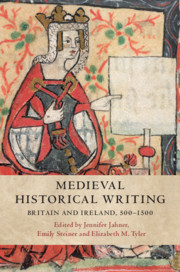Book contents
- Medieval Historical Writing
- Medieval Historical Writing
- Copyright page
- Contents
- Illustrations
- Notes on Contributors
- Abbreviations
- General Introduction
- Part I Time
- Chapter 1 Gildas
- Chapter 2 Monastic History and Memory
- Chapter 3 Apocalypse and/as History
- Chapter 4 The Brut: Legendary British History
- Chapter 5 Genealogies
- Chapter 6 Anglo-Saxon Futures: Writing England’s Ethical Past, Before and After 1066
- Chapter 7 Pagan Histories/Pagan Fictions
- Part II Place
- Part III Practice
- Part IV Genre
- Bibliography
- Index
Chapter 3 - Apocalypse and/as History
from Part I - Time
Published online by Cambridge University Press: 19 December 2019
- Medieval Historical Writing
- Medieval Historical Writing
- Copyright page
- Contents
- Illustrations
- Notes on Contributors
- Abbreviations
- General Introduction
- Part I Time
- Chapter 1 Gildas
- Chapter 2 Monastic History and Memory
- Chapter 3 Apocalypse and/as History
- Chapter 4 The Brut: Legendary British History
- Chapter 5 Genealogies
- Chapter 6 Anglo-Saxon Futures: Writing England’s Ethical Past, Before and After 1066
- Chapter 7 Pagan Histories/Pagan Fictions
- Part II Place
- Part III Practice
- Part IV Genre
- Bibliography
- Index
Summary
To understand fully English medieval history writing, it is necessary to recognize the ways in which Christians interpreted universal history as teleological, as ranging from creation to doomsday, and as including both past events and future expectations of the Last Days. This essay surveys the apocalyptic nature of universal history based on four scriptural structures: the two dispensations encapsulated in the Christian Bible and symbolized by Synagoga and Ecclesia; the Pauline Three Laws (ante legem, sub lege, and sub gratia); the visions of Daniel interpreted as prophesies of four sequential kingdoms concluding with Rome; and creation week considered as an analogy for Six Ages of the World. The essay then examines in greater depth the intertwining of history and apocalyptic prophecy in two English manuscripts: the thirteenth-century Gulbenkian Apocalypse illustrating the Latin commentary on Revelation by Berengaudus; and a fifteenth-century Carthusian miscellany depicting the Middle English Revelations of Pseudo-Methodius.
Keywords
- Type
- Chapter
- Information
- Medieval Historical WritingBritain and Ireland, 500–1500, pp. 51 - 66Publisher: Cambridge University PressPrint publication year: 2019

